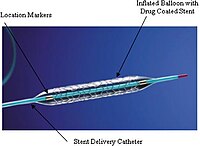
Photo from wikipedia
BACKGROUND Drug-eluting stents (DES) reduce stent restenosis compared with bare-metal stents (BMS). However, their use in patients requiring long-term oral anticoagulation (OAC) is controversial owing to increased risk of bleeding… Click to show full abstract
BACKGROUND Drug-eluting stents (DES) reduce stent restenosis compared with bare-metal stents (BMS). However, their use in patients requiring long-term oral anticoagulation (OAC) is controversial owing to increased risk of bleeding associated with OAC plus antiplatelet treatment over time. OBJECTIVE To assess the safety of DES vs BMS in patients requiring long-term OAC for any reason. METHODS Prospective observational multicenter study conducted at 6 teaching centers of patients undergoing percutaneous coronary intervention who required OAC for any reason. Adverse outcomes were analyzed at 1 year of follow-up. RESULTS We identified 1002 patients requiring OAC (mean age: 72 years, male 72%). Six- hundred and thirteen patients (61.2%) received BMS and 389 (38.8%) DES. Diabetes, previous PCI, myocardial infarction and acute coronary syndrome at admission (P < 0.0001) were more common in patients with DES. Antithrombotic prescribing was similar at discharge between groups (TT: 51.5% vs 50.9%, clopidogrel plus OAC: 7.0% vs 5.0% and DAPT: 41.4% vs 42.7%, p = 0.52). DES and BMS patients showed similar rates of total bleeding (15.2% vs 13.4%, adjusted HR 0.82 [0.58-1.17, p = 0.82 and major bleeding (6.2% vs 6.0%; adjusted HR 1.22 [0.71-2.09], p = 0.46) and MACE (15.2% vs 18.6%, adjusted HR: 0.82 [0.57-1.17], p = 0.28, while restenosis was lower in patients with DES (5.3% vs 8.5%, adjusted HR. (0.52 [0.29-0.92], p = 0.02. Cox analysis after propensity score selection of 368 matched pairs demonstrated that DES use was not associated with a higher incidence of total bleeding or major bleeding. CONCLUSION DES use is safe in patients with an indication for long-term OAC.
Journal Title: Thrombosis research
Year Published: 2019
Link to full text (if available)
Share on Social Media: Sign Up to like & get
recommendations!